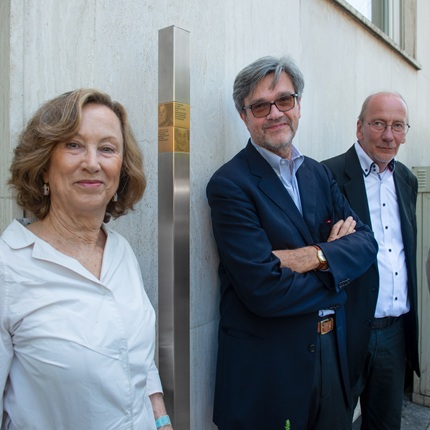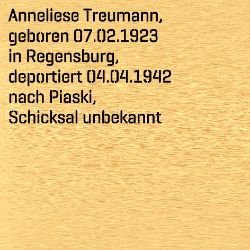Lina Moos, who came from a Jewish family, married the Jewish factory owner Alfred Binswanger when she was just 19. Alfred Binswanger ran the liqueur factory Edmund Jacobi Nachfolger at Wöhrdstraße 11 in Regensburg, which was located on an island in the middle of the Danube. After their wedding, the couple moved to a house next to the factory. In 1893 their daughter Elisabeth was born, followed a year later by their second daughter, Martha. In letters to their relatives, Lina and Alfred Binswanger described many happy moments in their life as a family at this time, including the banquets at a long table on the bank of the river. During the First World War, Lina Binswanger worked as a volunteer in a communal kitchen organised by the City of Regensburg, and for this she was awarded the Iron Cross. Just a few weeks after the Nazi seizure of power, on March 30, 1933, Alfred Binswanger was arrested by SA men. Although he was released the next day, the arrest and the boycott of the family business contributed to his early death in November 1933. In 1936, Wilhelm Braun “aryanized” the liqueur factory in Regensburg. In June 1934, Lina Binswanger moved to Munich, where she lived at first at Destouchesstraße 16. Following the death of her daughter Martha from multiple sclerosis in January 1937, she moved into Martha’s apartment at Leopoldstraße 102 and looked after her 14-year-old granddaughter, Anneliese. In October 1939, they and other Jewish women were forcibly accommodated in an apartment at Franz-Joseph-Straße 15. They were subsequently moved around to various other places, including a bed and breakfast at Amalienstraße 54, the owner of which, Anni Hauser, took care of Lina Binswanger until she was deported to Theresienstadt on June 25, 1942. Lina Binswanger died there on May 7, 1943. Her granddaughter Anneliese, too, did not survive the Shoah. (text: Mara Fazio and Claudio Lindner; editor: C. Fritsche; translation: C. Hales)






